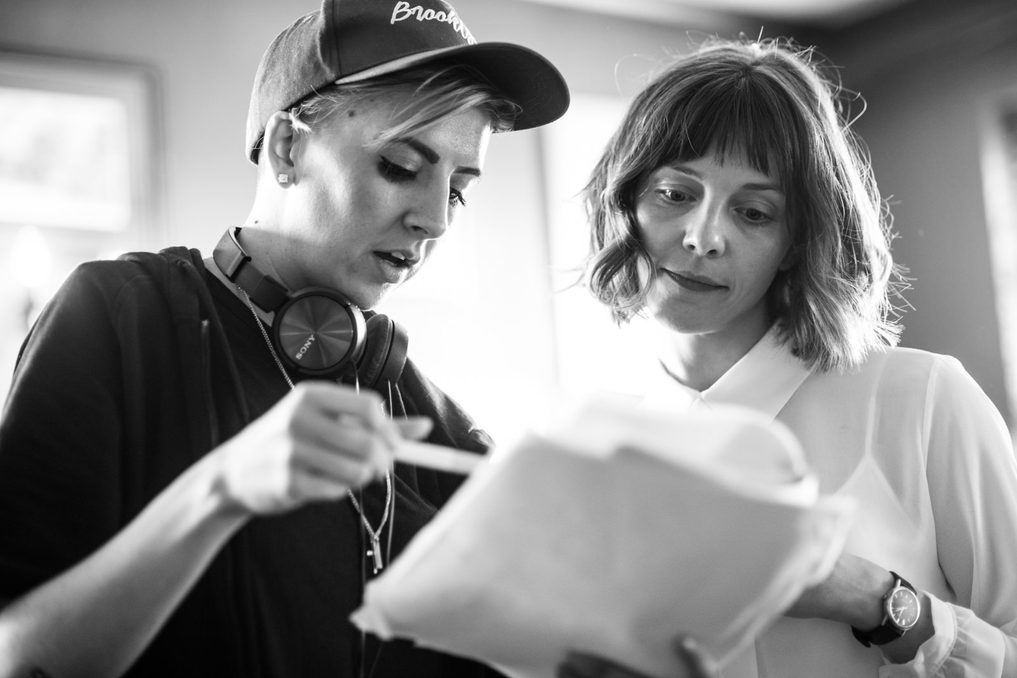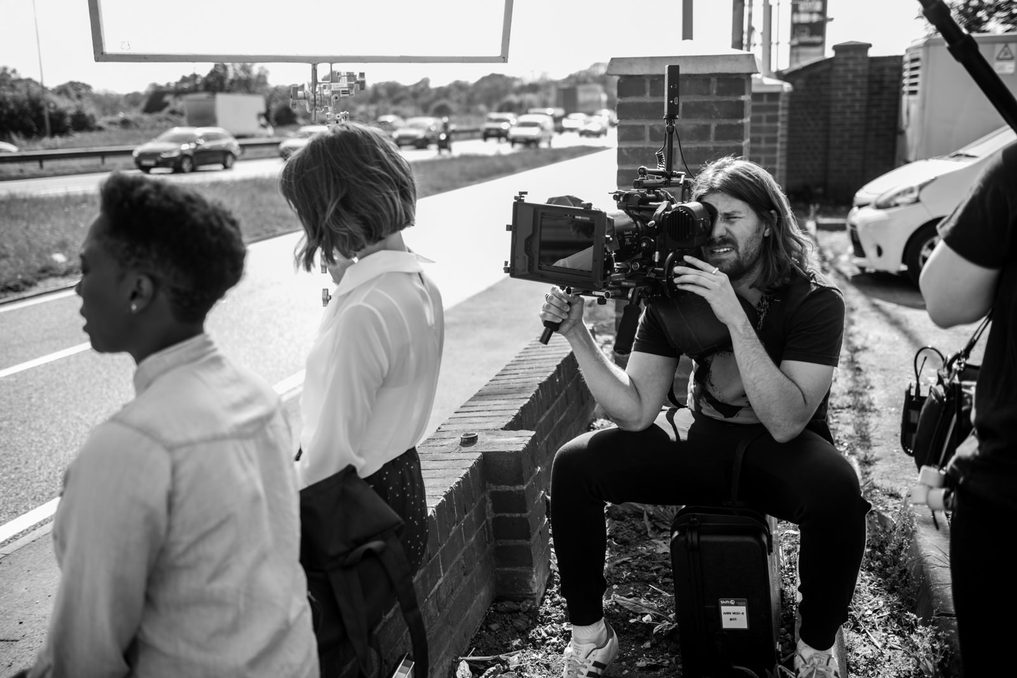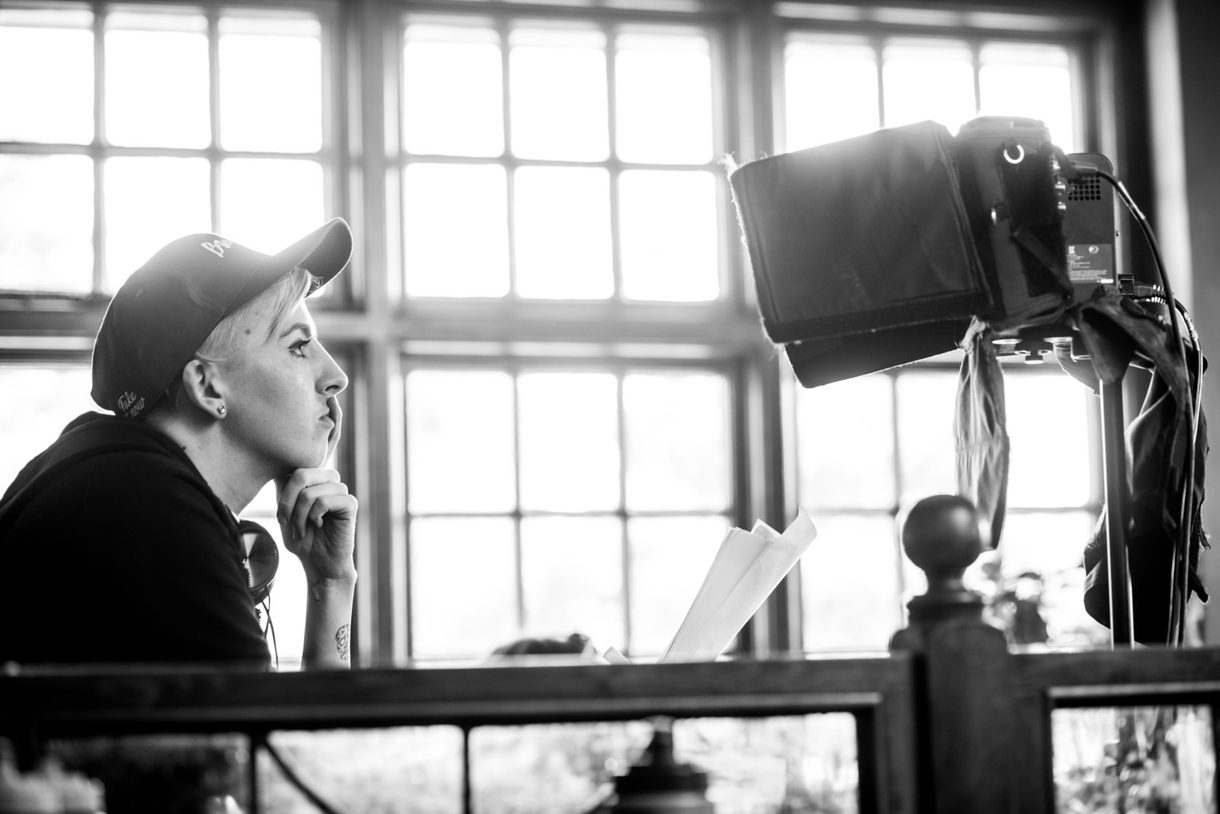News Story

Baby Gravy is a comedic and touching portrayal of same sex couple, Brona and Alex, awaiting the arrival of a man named Karl. It had a successful festival run, including official selection for the BFI London Film Festival, Women of the Lens 2018 and nominated for the Jury Award for Best British Short at British Shorts Berlin. Jade Anouka also won the Best Actress Award at the New Renaissance Film Festival Amsterdam for her role as Alex. We interviewed the team behind Baby Gravy.
You can watch Baby Gravy here.
Follow producer Michelle Antoniades (@Miantes) and production company Hazey Jane Films (@HazeyJaneFilms) on Twitter and director Marley Morrison (@marley_morrison) on Instagram for updates on Baby Gravy and its distribution.
What was your journey into the film industry like?
Marley Morrison (Director/Writer) - My journey was one of trial and a lot of error. I began by shooting my own music videos for my friends and that developed into short films and eventually features. It was all very DIY. I learnt a lot from Youtube, reading scripts online and just experimenting by myself. I applied for every opportunity and worked on my own scripts outside of my day job for many years.
Michelle Antoniades (Producer) - I had a mixed background of working in small business, music and theatre and was looking for new creative opportunities. I met Marley very early on in my film career and learnt about the film industry from the ground up. My first job in the industry was interning at a start-up production company, then I got a job as a Production Secretary in TV documentaries and worked my way up, whilst learning about the practical side of production.
In your own words, could you tell us, what is Baby Gravy about?
MM - Baby Gravy is about the nuances, challenges and sometimes hilarious situations in relation to same sex parenting. Brona and Alex are totally committed to their relationship and want to take it to the next stage. To do that they need a donor sperm and this is where the story starts.
I have often been asked if I want children? And if so, how do I intend to make that happen? Knowing how difficult and challenging the process is for same sex couples I felt it was a big part of the LGBTQ experience that isn’t much spoken about.
This film came about through me attempting to answer the difficult questions about same sex parenting and beginning the journey in my own life with my partner.
Michelle, how did you and Marley meet and establish your Producer/Director working relationship? As a Producer what drew you to the script?
MA - We met through a mutual friend, and discovered that we had the same aspirations to increase the visibility of LGBTQ+ and female driven stories on screen.
Every writer/director has a different creative process. I learnt about Marley’s process early on, and also shared what I was learning on the producing side, so there’s always an open channel of communication and an understanding of each other’s role.
Baby Gravy was our third short under Hazey Jane Films, and a continuation of Marley’s storytelling style of dealing with difficult subject matters through comedy. This script did that so effortlessly because it was rooted in authenticity, therefore it was a natural progression for our first public-funded short.
Tell us about your experience with the Film London/BFI NETWORK Short Film Team. What did you learn from being on the programme?
MM - I have learnt a huge amount from the team at Film London and the BFI, I truly wouldn’t be where I am without the support of these two incredibly important organizations.
I learnt a lot about the business side of filmmaking as well as how to effectively prepare for a shoot. They helped me understand how less is more in shorts and the advice they gave helped get my script to a better place.
The support and encouragement they gave me also hugely increased my confidence in relation to pitching, filmmaking and moving forward in the industry.
MA - There was a lot of support during script development and throughout production. Film London and BFI Network ran some invaluable seminars in the lead up to the shoot, which covered everything from budgeting to post production to festival strategy. This was also the first time we used a post-production house for grade, sound mix and delivery and being involved in this process helped us to prepare for the feature film.

What was your creative process in your discipline like as a Director/Writer and Producer? How did you get ready to make the short film?
MM - There are many things to think about when making a short film. Regarding Baby Gravy we needed one location and two main actors so our first job is to secure a location.
Our budget wouldn’t stretch to a casting director so we did a casting call on Twitter, and ended up finding the leads via recommendations from friends... Charlie Hanson (Producer) who suggested Jade Anouka (Alex) and Kate Herron (Director) who suggested Sophia Di Martino (Brona). The supporting artists, we found through local amateur drama groups.
I prepared for the shoot by spending time with the DP honing the look and tone of the film, I spent time rehearsing with the actors and finalised the costume and art department looks. I adjusted the script slightly as per rehearsals and then spoke to my AD about what I need on the day.
The thing to remember is to try and speak to each member of your crew independently and as a collective so you are all on the same page on day one of your shoot.
MA - I get involved from the scripting stage. First as a sounding board for the writer, but also to troubleshoot any “impossible” ambitions (e.g. if you have a tiny budget you can’t really afford to film a car crash or licence a James Brown song!) so together we find alternatives that fit the story. Once the script is a bit further along, we’ll consult the key creative team (DOP, Editor, Production Designer) so they can also troubleshoot anything in the script that might affect the limited budget.
For Baby Gravy, there were elements in the story that wouldn’t change, i.e. the roadside location, so we were able to start scouting early on and do recce’s whilst still finalising the script, this way Marley could work the layout of the location into the story.
I also secured the post production house in advance to allow us more time for editing and post, as we knew from previous shorts that this stage would require the most time.
What was one challenge you faced on the project? How did you overcome it?
MM - With such a low budget we had to save money where possible. Which meant we didn’t have the funds for background artists as we would have liked. The film was set in a pub so we needed some other people. The way we overcame this was by framing the background artists we did have in strategic ways so the place looked busier than it actually was. Also focusing on our two main characters using close ups.
When we got to the edit we realised the film was running 5 minutes longer than intended. I learnt that you cannot be too precious in the edit and sometimes you really do have to ‘kill your babies’ if it is not serving the story. Whilst cutting it is also good to remember why you made the film and hold onto that as much you can. A lot of people may have an opinion on what is best but in the end you have to be happy with the film you finish with so make sure no matter what it is true to your voice.
MA - Finding the right location took way longer than expected. It was originally set in a big service station, but it soon became apparent that it wasn’t going to be feasible to film there, especially on our budget. So we discussed using a different roadside location, without compromising the story. Once we’d made this decision, I found the roadside restaurant quite quickly and it just so happened to have all the elements we needed. We also had a really tight filming schedule, but being in a smaller location meant everything was more contained which allowed us to work to a more manageable timeframe.
We love that both Baby Gravy and Sweetheart tell queer stories without focusing on the difficulties of coming out or the trauma that's often a focus of LGBTQ+ stories that make it to screen. Can you tell us a little about your choices around the stories you want to tell?
Marley Morrison - Exactly that. I never wanted to make films about the trauma of being gay I think we’ve seen that and it never really makes me feel good about my sexuality. Whilst coming out is a topic to be explored my interest was more in the relationships and nuances after someone has come out. I think there is a lot of challenges and humor in just being an out gay person in the 21st century.
I also wanted to acknowledge how far we have come in LGBTQ+ rights and that the struggles we face nowadays are different to those who came before us.
As well as that I think it has always been important to me for me to show Queer characters having happy endings which is something I rarely saw when I was growing up watching TV.
You have officially released your debut feature ‘Sweetheart’ which has gone on to premiere at Glasgow Film Festival Congratulations! Name one win and one challenge you faced going from short form to long form.
MM - The challenge for me was writing a script that could hold the attention of the audience for more than 10 minutes. Whereas shorts focus generally on one incident or ‘beat’ a feature has many beats that all need to tie in together in a cohesive way. Also tonally my work shifts from comedy to drama so I was always concerned about getting the balance right.
My win was definitely the amazing cast we managed to assemble for such a low budget film. I was very lucky.
MA - Every aspect of a micro-budget feature is a challenge! But we were lucky enough to work with some great people at each stage of the process, who believed in the story and generously gave their time and energy to help us bring it to life. I guess trying to complete the film during a pandemic was probably the biggest challenge.
Win - the Audience Award at Glasgow Film Festival!

You have proved that sustainable practice is achievable for productions of all sizes, from low-budget shorts to big features and can help productions save money by making better use of resources. What advice would you give to filmmakers considering a greener route for their productions?
MA - There are some really simple and effective changes you can make that won’t cost you more time or money. Use what’s available to you and make easy changes to start with; reusable water bottles, using phones/tablets instead of paper, choose second hand instead of new. Encourage all departments to choose sustainable materials and minimise waste, from prep all the way through to post. Have clear recycling protocols on set and get the cast and crew involved because it’s everyone’s responsibility to protect the environment. And of course check out Green Screen and Albert for more resources.
What were your experiences like going from short film to a long form feature? How did you work through the changes?
MM - Going from shorts to features is a huge step. Everything is bigger. There are more crew, more cast, more money, more problems. It is also a lot of pressure to take on as a filmmaker. You really are treading completely new ground and that’s part of the fun of it all but can also be incredibly challenging. The best way I have found to adapt is to build a trustworthy team around you. Make sure you have a good honest relationship with your producer and build those bonds with your crew. They are the ones that will get you through the long days and nights. Take criticism politely and always assume there is something you can learn. As well as that, be confident in yourself and communicate with your team.
MA - It was mainly a lot more preparation and learning to manage all the different elements of a production on a much larger scale. In the lead up to the feature, I worked in the production department on various other films and TV series, with the aim of gaining more knowledge and experience. I also spoke to some producers and directors who’d just made their first features, to try and understand what their successes and challenges were, so I’d be more prepared for any curve balls that came my way. Having a plan B, plan C and so on, allows you to be adaptable and think on your feet if something changes, which it will!
What advice would you give to other filmmakers embarking on making their first short film right now?
MM - Look after yourself. It sounds obvious but filmmaking can be exhausting. Making sure you are staying healthy and rested is so important.
Have a rough plan b in your head always, things will always change, weather will fall and plans will fail at the last minute - It’s good to work on being flexible and having options if things don’t quite work out as planned.
Keep your cast and crew small where possible and use what you have access to. Stories can flourish in a surprising variety of environments.
Don’t try and be too clever. Think less about what you want the audience to have learnt after watching the film but more about how you want them to feel.
MA - Watch lots of short films. Read scripts. Speak to people who’ve done it before. Keep it simple, write what you know and play to your strengths. Then get out there and make something! Remember the legal side, find out about location permissions, release forms and risk assessments; it’s good practice to do things the right way during shorts so it’ll be less daunting when you get to features. Producing and writing are both quite lonely processes at times so check in with each other, share your problems and find solutions together.
To wrap up, you have to give us a FILM LONDON/BFI NETWORK exclusive. What’s next for you both? Anything you’re currently working on?
MM - Currently I’m working on a few different things. I’m writing several TV projects including a comedy/YA TV series and a period dark comedy/horror, both with Michelle Antoniades. As well as that I am also directing the second block of a new YA ITV2 show and hopefully directing a feature film in the US next year.
MA - We’re currently developing various Hazey Jane projects for TV, including a YA series co-produced with Parkville Pictures. Plus some exciting collaborations with new and emerging UK talent! Watch this space… and our socials ;)

If you’d like to make a short film, we can help!
Find out more about the BFI NETWORK Short Film Fund. Need inspiration? Check out our Vimeo channel.
Want to find out more about our events programme for emerging filmmakers in London? Follow us on Twitter and Instagram